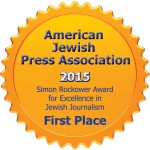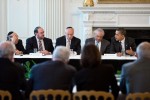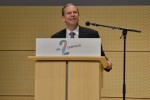Amna Farooqi speaks at Temple Sholom during her March 13-14 visit to Vancouver. (photo by David Berson)
Amna Farooqi, a rising peace activist who aims to transcend the division between being pro-Israeli and pro-Palestinian, was in Vancouver March 13-14 to speak at Temple Sholom and at the University of British Columbia.
Last year, Farooqi, a Muslim-American woman from a Pakistani family, made international headlines when she was elected head of J Street U, the student organizing arm of J Street, which calls itself “the political home for pro-Israel, pro-peace Americans.” She presents a unique perspective: she is against the boycott, divestment and sanction movement and is pro-Zionist, while also being against the occupation, critical of settlements and deeply concerned for Palestinian dignity and human rights. Temple Sholom, the Progressive Jewish Alliance, Or Shalom, Ameinu Canada and JSpaceCanada sponsored her visit to Vancouver.
Farooqi, who finished her term at J Street U as she graduated from the University of Maryland, continues to be active in J Street and spoke at their annual conference last month, which also included Bernie Sanders as a speaker.
Farooqi told the Jewish Independent that she grew up in a religious but progressive Muslim home where politics were a constant topic of discussion. “Have tea and talk politics,” she said. “Very much like Israelis.”
After 9/11, the topics shifted from things happening in India, Pakistan and throughout the Muslim world to American politics and the condition of American Muslims, she said. “In middle school, I began wearing a headscarf to school. I liked wearing the hijab to provoke conversation, and to say that one can be Muslim and American, one does not have to choose one or the other.”
In high school, Farooqi, who had been raised with a concern for Palestinians, began learning more about the Israeli-Palestinian conflict and fiercely sided with the Palestinians. In 2011, when the Palestine Liberation Organization made a bid for statehood at the United Nations, Farooqi supported it and found herself in an emotional fight with a Jewish friend that came to raised voices and tears. “I realized then that I did not know enough about the conflict,” she said.
Farooqi took Israeli studies courses in college, heeding her parents’ advice that the situation was complex and she should refrain from becoming involved in the debate unless she first studied it in detail. Farooqi’s turning point came when one of her professors had students take part in an involved role-playing exercise, where pro-Palestinian students studied and defended a Zionist (hers was David Ben-Gurion) and pro-Israel students the opposite. This was the beginning, she said, of her “falling in love with Zionism,” without losing her deep concern for the Palestinians.
Over time, Farooqi got more involved with the J Street U chapter at her university, and she spent a semester abroad in Israel studying at Hebrew University, as part of an international student exchange program; the first of several trips.
“My first trip to Israel was an emotionally intense experience from start to finish,” she told the Independent. “There is not a moment in Jerusalem where you are not exposed to diverse perspectives. Everywhere you go there is history, tragedy and beauty.”
She had a Passover seder with a settler family and dined with families in the West Bank. “I remember one visit to the West Bank with some Jews concerned about Palestinian human rights. We visited one family bringing gifts. A young Palestinian child approached my Jewish friends with wonder, and said, ‘You are Jews?’ Bewildered, the child pointed to a nearby house of settlers. ‘But they are Jews.’”
Asked what she perceives as the way forward in today’s increasingly volatile climate, Farooqi said, “It’s a difficult moment. I think the path forward lies in investing in civil society on all sides. None of the governments involved is in a position to show real leadership at the moment.”
Farooqi said the key will lie in building relationships on the ground and in looking at a holistic picture of what drives people on both sides whose behaviour is bstructing peace. “You cannot understand settlers unless you understand the need for affordable housing in Israel,” she said, “and you cannot understand Palestinians who join Hamas unless you understand it may be the only way for them to put food on the table.”
Farooqi said she is excited by the rise of a new Sephardi left in Israel, which she hopes will help inspire a “new, young left” in the country, with ideas that go beyond those of previous generations. And she would like to see more done to help younger Palestinians understand that many Israelis value their rights. “Younger Palestinians need to know that,” she said. “It will change the elections of the future. Palestinians need economic opportunity, and they need real vision and hope. They must be given a real political and economic horizon.”
Speaking of the international Jewish community, Farooqi said, “If you are a pro-Israel, pro-peace, two-state solution person, invest in communal support for that and be careful [about] who we host, who we support, what message are we sending out.”
Even though she is against BDS, she disagrees with the recent Israeli travel ban of BDS supporters. “I oppose the travel ban because going to Israel and actually talking to Israelis made me more pro-Israel,” she said.
She added, by way of warning, that “Diaspora Jews underestimate the far-right in Israel. Many moderates have become disengaged on Israel, whereas big supporters on the far-right have not.”
Speaking of Sanders’ talk at the recent J Street conference, Farooqi said, “I thought it was a great speech, significant for lots of reasons. Sanders talked about 1948 in a beautiful way, talking of the progressive vision of Zionism and his experiences on a kibbutz, but also talking of the effect on the Palestinians. You can acknowledge both. It is rare for a U.S. politician to do that.”
Now that her term at J Street U is over, Farooqi is turning her attention to affairs at home and looking to get involved in organizing in the United States. “We have our own crisis of democracy to deal with,” she said.
Matthew Gindin is a freelance journalist, writer and lecturer. He writes regularly for the Forward and All That Is Interesting, and has been published in Religion Dispatches, Situate Magazine, Tikkun and elsewhere. He can be found on Medium and Twitter.




